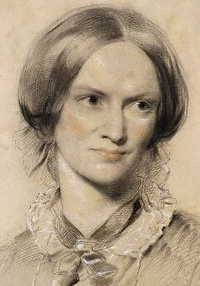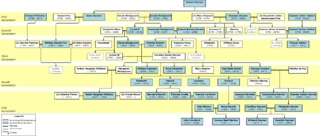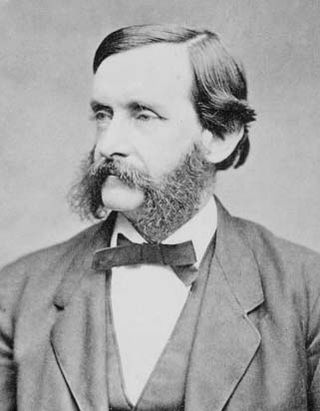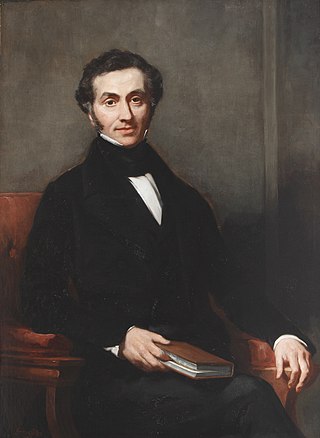
Charlotte Nicholls, commonly known as Charlotte Brontë, was an English novelist and poet, the eldest of the three Brontë sisters who survived into adulthood and whose novels became classics of English literature. She is best known for her novel Jane Eyre, which she published under the male pseudonym Currer Bell. Jane Eyre went on to become a success in publication, and is widely held in high regard in the gothic fiction genre of literature.

Thomas Woolner was an English sculptor and poet who was one of the founder-members of the Pre-Raphaelite Brotherhood. He was the only sculptor among the original members.

Emily Elizabeth Dickinson was an American poet. Little-known during her life, she has since been regarded as one of the most important figures in American poetry. Dickinson was born in Amherst, Massachusetts, into a prominent family with strong ties to its community. After studying at the Amherst Academy for seven years in her youth, she briefly attended the Mount Holyoke Female Seminary before returning to her family's home in Amherst. Evidence suggests that Dickinson lived much of her life in isolation. Considered an eccentric by locals, she developed a penchant for white clothing and was known for her reluctance to greet guests or, later in life, even to leave her bedroom. Dickinson never married, and most of her friendships were based entirely upon correspondence.

James Martineau was a British religious philosopher influential in the history of Unitarianism.

Harriet Martineau was an English social theorist. She wrote from a sociological, holistic, religious and feminine angle, translated works by Auguste Comte, and, rare for a woman writer at the time, earned enough to support herself. The young Princess Victoria enjoyed her work and invited her to her 1838 coronation. Martineau advised "a focus on all [society's] aspects, including key political, religious, and social institutions". She applied thorough analysis to women's status under men. The novelist Margaret Oliphant called her "a born lecturer and politician... less distinctively affected by her sex than perhaps any other, male or female, of her generation."
The Theory of Moral Sentiments is a 1759 book by Adam Smith. It provided the ethical, philosophical, economic, and methodological underpinnings to Smith's later works, including The Wealth of Nations (1776), Essays on Philosophical Subjects (1795), and Lectures on Justice, Police, Revenue, and Arms (1763).

The Darwin–Wedgwood family are members of two connected families, each noted for particular prominent 18th-century figures: Erasmus Darwin, a physician and natural philosopher, and Josiah Wedgwood FRS, a noted potter and founder of the eponymous Josiah Wedgwood & Sons pottery company. The Darwin and Wedgwood families were on friendly terms for much of their history and members intermarried, notably Charles Darwin, who married Emma Wedgwood.

Thomas Wentworth Higginson, who went by the name Wentworth, was an American Unitarian minister, author, abolitionist, politician, and soldier. He was active in abolitionism in the United States during the 1840s and 1850s, identifying himself with disunion and militant abolitionism. He was a member of the Secret Six who supported John Brown. During the Civil War, he served as colonel of the 1st South Carolina Volunteers, the first federally authorized black regiment, from 1862 to 1864. Following the war, he wrote about his experiences with African-American soldiers and devoted much of the rest of his life to fighting for the rights of freed people, women, and other disfranchised peoples. He is also remembered as a mentor to poet Emily Dickinson.

Lant Carpenter was an English educator and Unitarian minister.

Hannah Adams was an American author of books on comparative religion and early United States history. She was born in Medfield, Massachusetts and died in Brookline. Adams is believed to have been the first woman in the U.S. to work as a professional writer.

The Martineau family is an intellectual, business and political dynasty associated first with Norwich and later also London and Birmingham, England. Many members of the family have been knighted. Many family members were prominent Unitarians; a room in London's Essex Hall, the headquarters building of the British Unitarians, was named after them. Martineau Place in Birmingham's central business district was named in their honour.

The Quincy family was a prominent political family in Massachusetts from the mid-17th century through to the early 20th century. It is connected to the Adams political family through Abigail Adams.
Sydney Martineau was a British fencer who took part in the 1912 Olympics in Stockholm, and the Fencing at the 1908 Summer Olympics – Men's épée.
William Mountford was an English Unitarian preacher and author.

Samuel Bache was an English Unitarian minister.
James De Ville was a British lamp maker, sculptor and plaster-caster, known also as a phrenologist. He acquired moulds and busts for business purposes, manufacturing reproductions, and also built up a renowned phrenological collection.

Frances Elizabeth Lupton was an Englishwoman of the Victorian era who worked to open up educational opportunities for women. She married into the politically active Lupton family of Leeds, where she co-founded Leeds Girls' High School in 1876 and was the Leeds representative of the North of England Council for Promoting the Higher Education of Women.

Harris Manchester College (HMC) is one of the constituent colleges of the University of Oxford in the United Kingdom. It was founded in Warrington in 1757 as a college for Unitarian students and moved to Oxford in 1893. It became a full college of the university in 1996, taking its current name to commemorate its predecessor the Manchester Academy and a benefaction by Lord Harris of Peckham.

John James Tayler (1797–1869) was an English Unitarian Minister.














